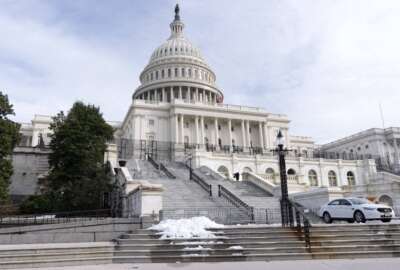For contractors, early 2022 is starting to look a bit too much like late 2021
Federal contractors face looming continuing resolution deadlines just a month off. They're also facing an ever tighter compliance and small business contracting...
Best listening experience is on Chrome, Firefox or Safari. Subscribe to Federal Drive’s daily audio interviews on Apple Podcasts or PodcastOne.
Federal contractors face looming continuing resolution deadlines just a month off. They’re also facing an ever tighter compliance and small business contracting regime. For what’s ahead, the President and CEO of the Professional Services Council (PSC) David Berteau spoke to the Federal Drive with Tom Temin.
Interview transcript
Tom Temin: And I guess, David, it sounds like 2022 is picking up precisely as a mirror image from where 2021 left off?
David Berteau: Well, we were hoping it’d be a little better Tom, and there’s room for improvement, we’re going to continue focusing on that. But let’s start with availability of funds to keep the government operating. Back in December, Congress extended the continuing resolution to fund all government operations and the new deadline is February 18. We face kind of three options when we get to that deadline, number one, and probably the most likely option is another continuing resolution to extend funding for some period of time, maybe four or six weeks, they’re still talking about how long that would be. A second option, of course, would be to reach a budget agreement and fund appropriations for the rest of the fiscal year, which by February 18, we’re going to be, you know, four-and-a-half months into the fiscal year out of 12 months. So that’s a pretty big chunk already behind us. The third option, of course, is not reaching agreement at all, and not extending anything and having a full or partial government shutdown. That is the least likely option, but it’s the one that would cause the most disruption. So it’s always prudent to prepare for that possibility if you’re a contractor, and and PSC does provide advice to its members to help do that preparation. But let’s look at that most likely option, which is a continuing resolution that extends for maybe four, maybe six more weeks. What’s the impact of that it’s a real issue that we have to look at not only on contractors, but on government operations itself, you know, the one we know most about is no new starts and its corollary, which is no stopping of anything old, which is often just as wasteful as not starting the new things, real dampening effect on innovation, technology advancement, and so on. But I think there’s a far more insidious impact, and that is the impact on delaying contract awards, even if the funding is available from prior year appropriations or under the continuing resolution.
You know, years ago, PSC was instrumental in getting Congress to enact legislation requiring the federal government to define what procurement lead time looks like to collect the data on how long it takes, and to make that data publicly available. Well, I don’t know if they’re doing those first two, defining and collecting, but they’re certainly not doing the third, they’re not making it publicly available. So we don’t have any reliable government data on lead times. But all of the information from PSC’s members are it’s taking longer and longer for contracts to be awarded. And that I think, is the most insidious impact of a CR (continuing resolution). The third, of course, is, you know, there’s a lot of questions about authorities that agencies had under last year’s appropriation or under other legislation that hasn’t been extended. And the only way you can extend those authorities under a continuing resolution is through the insertion of language known as anomalies. So in other words, the continuing resolution says, keep doing what you’re doing, don’t do anything else, except for these anomalies and the anomalies would be the authorities that will come into play.
Tom Temin: In some ways. The anomaly is really a I don’t know how to put it, but it seems like an illegal way almost of getting around what they have imposed legally.
David Berteau: Well, it is. And for that reason, both OMB (Office of Management and Budget) and the appropriators tend to not want to use anomalies, because if you use too many, it makes CRs even more acceptable, or seemingly more acceptable, which is a bad outcome. And so but on the other hand, if you’re going to have a series of CRs that extend out through the rest of the fiscal year, you need those anomalies in order to operate. The question is, will they be in those bills, who will put them in there? One anomaly that was missing from the September and December extensions is, of course, our old friend Section 36-10, which is the authority that allowed the government to reimburse companies subject to available funds, no new funding required for workers who, as a result of COVID, were unable to access the workplace where they needed to be to do their work. And that authority expired, you know, back in October, and maybe even early November, people said, well, we’re not going to need it anymore. Well, clearly now we do need it with the government tightening up its own access to facilities and, you know, maximizing teleworking for government, often, by the way, not maximizing teleworking for contractors. This is an example of the kind of anomaly that PSC would be urging Congress to put in past a full year appropriation.
Tom Temin: We’re speaking with David Berteau, President and CEO of the Professional Services Council. And I guess I hadn’t heard that notion of governing by anomaly.
David Berteau: It has not been very common and we’re going to in fact, the House Appropriations Defense Subcommittee has a hearing Wednesday on the impact of the CR on defense, and I suspect some of what they will look at are some of the anomalies that would be needed there. As far as I know, there are no hearings scheduled for the impact on the civilian agencies, which, of course, is half the government operations and spending and 40% of services contracts. So PSC is very worried about that side of it as well. I think this is a serious issue. It’s under attended. It only matters if you don’t get a full year appropriation though, Tom. And right now, we don’t have agreement on a number. And we don’t have a path to get those full year appropriations.
Tom Temin: And at the same time, there are other spending sources coming from other legislation. In particular, there’s, I think, $125 billion or so not a whole lot, but some money available for spending under the infrastructure bill.
David Berteau: Right. And if you look at what the role of contractors of federal government contractors would be there, in many cases, the funds will be spent by the states, because that’s where a lot of infrastructure projects originate, and are mandated. But the support for that, particularly the support that lets you get through the permitting process, as you well know, and you’ve had a number of discussions about this on your show, the long pole in the tent is not getting the work done, the long pole in the tent is getting the permission to start the work, and to finish it. And I think infrastructure, so we would like to see a lot of focus on getting it right up front, getting the permitting process right. That’s where contractors come into play. We’re looking forward to a spending plan from the administration. We haven’t yet seen it. It’s coming out in dribs and drabs.
Tom Temin: And what about the small business mandates to increase the amount of contracting done with small business, as well as to increase the number of small businesses with which the government is doing business, even as that number shrinks in reality?
David Berteau: Right. So you have really three questions there. And let me start with your last one, the number of companies that are bidding are eligible to bid both on small business contracts, and on full and open competition contracts, continues to go down. And the government doesn’t seem to be all that worried about the competitive marketplace, although I think they should be. At the same time, there’s just push for getting new, non-traditional companies involved in the government process. But you read stories, and I think they’re very soundly based, that those companies are getting a little bit tired of the fact that it may take you two or three years of pursuing a contract before it finally gets awarded. Again, back to that slow process of awarding contracts itself. You can’t bring outside innovation in if it takes you two or three years to get there.
Tom Temin: And I imagine some small companies of that nature might have been trying to get funds under the Payroll Protection Plan, or one of the several other programs enacted early in the pandemic. And after that experience, they might say, well, why do I want to continue to do business with those people?
David Berteau: Well, I think the government has to think very hard about what it does to encourage companies to want to do business with the government, and many of the processes that we’ve talked about here. But there’s a second point that you hint at and that is the administration has emphasized, increasing the number of dollars awarded to certain parts of the small business community, with legitimate focus based on some of their executive orders, right? But is it a zero sum game where the only way you can make one category women owned businesses, minority owned businesses, service disabled veteran owned business, etc. The only way you can make that category go up is to have a negative impact on other categories, because there is a limited amount of work that can be done by small businesses without making them large businesses and therefore, ineligible for future small business work. And then there’s a third aspect, which is there are a lot of executive orders that were issued this past year. Many of them have promises of future federal contract regulations that will impact this marketplace. But we have yet to see those. It could be on climate change. It could be on diversity, and equity and inclusion and accessibility, all worthy goals, but things that we don’t yet know what the impact is going to be on either the competitive marketplace on individual companies and PSC is paying a lot of attention to that for its members.
Tom Temin: Yes. And by the way, to your point they added 75,000 The government added 75,000 pages last year to the Federal Register. Oh, that’s not really a big year. I think the year before it was 85,000. So you gotta pay attention to what’s going on.
David Berteau: We need our speed reading courses updated Tom so we can keep up with it.
Tom Temin: David Berteau is President and CEO of the Professional Services Council. As always, thanks so much.
David Berteau: Thank you.
Copyright © 2024 Federal News Network. All rights reserved. This website is not intended for users located within the European Economic Area.
Tom Temin is host of the Federal Drive and has been providing insight on federal technology and management issues for more than 30 years.
Follow @tteminWFED






